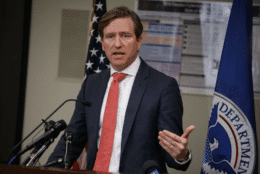Cybersecurity
-
The Army has used authorities from Congress to pay bonuses to service members with specific cyber skills and it now is looking for ways to incentivize civilian workers to stay.
January 28, 2020 -
For a long time the Federal Trade Commission has issued data security orders to companies that fail to protect consumers' private information.
January 27, 2020 -
Roger Waldron of the Coalition for Government Procurement pondered a law professor's denied request by GAO for documents in Overstock.com's pending protest over GSA's e-marketplace procurement.
January 24, 2020 -
Frank Dimina, vice president of Public Sector at Splunk, joined host John Gilroy on this week's Federal Tech Talk to explain why federal agencies should secure their data sets before applying machine learning and artificial intelligence.
January 24, 2020 -
The Army is starting a three-phase reform effort to tackle challenges in the Risk Management Framework, but says it's seen some major successes already.
January 24, 2020 -
CISA thinks of itself as the nation's risk advisor. To that end, Director Chris Krebs shared five areas of focus for the next few years, and six tips for a successful cybersecurity program.
January 23, 2020 -
On this edition of CyberChat, host Sean Kelley sat down with Todd Gustafson, President of HP Federal and Tommy Gardner, CTO of HP Federal to discuss the evolution and future of cybersecurity.
January 21, 2020 -
Jason Green, vice president Public Sector and Derek Weeks, vice president and DevOps Advocate at Sonatype join host John Gilroy on this weeks Federal Tech Talk to discuss open source software development and how their company can reduce cost and increase cybersecurity for federal agencies.
January 21, 2020 -
Joshua Spence, West Virginia's Chief Technology Officer, discussed his organization, new IT initiatives and reflections on 15 months in office.
January 16, 2020 -
CISA's emergency directive gives agencies mere days to assess the scope of the vulnerability to its systems, and 10 days to patch or remedy all its affected endpoints.
January 14, 2020 -
Federal cyber experts say the Homeland Security Department’s draft TIC 3.0 implementation guidance is well thought out and gives agencies the necessary leeway to find a secure way to the cloud.
January 14, 2020 -
The 2020 Defense authorization bill includes almost 1,800 pages and we found several important and interesting provisions that you should know about ranging from military cyber advisers to the possible return of lead system integrators.
January 13, 2020 -
Federal Drive with Tom Temin got more details from the chair of the Cybersecurity and Technology Program at the Aspen Institute, John Carlin.
January 13, 2020 -
Greg Wilshusen, the director of information security issues at GAO, said barriers still stand in the way of agencies sharing cyber threat information with each other and with their partners in the private sector.
January 13, 2020 -
SANS analyst David Hazar joined Federal Drive with Tom Temin for the details.
January 10, 2020
















